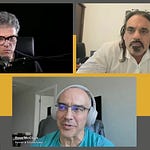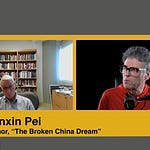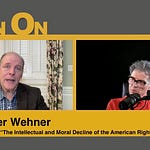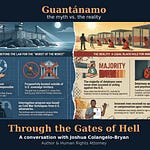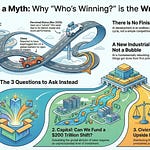Why is reforming capitalism so essential? In the latest issue of Liberties Quarterly, Tim Wu argues that unregulated capitalism not only leads to economic monopolies, but also drives populist anger and authoritarian politics. In “The Real Road to Serfdom”, Wu advocates for "decentralized capitalism" with distributed economic power, citing examples from Scandinavia and East Asia. Drawing from his experience in the Biden administration's antitrust efforts, he emphasizes the importance of preventing industry concentration. Wu expresses concern about big tech's growing political influence and argues that challenging monopolies is critical for fostering innovation and maintaining economic progress in the United States.
Here are the 5 KEEN ON AMERICA takeaways from our interview with Tim Wu:
Historical Parallels: Wu sees concerning parallels between our current era and the 1930s, characterized by concentrated economic power, fragile economic conditions, and the rise of populist leaders. He suggests we're in a period where leaders are moving beyond winning elections to attempting to alter constitutional frameworks.
The Monopoly-Autocracy Connection: Wu argues there's a dangerous cycle where monopolies create economic inequality, which generates populist anger, which then enables authoritarian leaders to rise to power. He cites Hugo Chavez as a pioneer of this modern autocratic model that leaders like Trump have followed.
Decentralized Capitalism: Wu advocates for an economic system with multiple centers of distributed economic power, rather than just a few giant companies accumulating wealth. He points to Denmark, Taiwan, and post-WWII East Asia as successful examples of more balanced economic structures.
Antitrust Legacy: Wu believes the Biden administration's antitrust enforcement efforts have created lasting changes in legal standards and public consciousness that won't be easily reversed. He emphasizes that challenging monopolies is crucial for maintaining innovation and preventing industry stagnation.
Big Tech and Power: Wu expresses concern about big tech companies' growing political influence, comparing it to historical examples like AT&T and IBM. He's particularly worried about AI potentially reinforcing existing power structures rather than democratizing opportunities.
Complete Transcript: Tim Wu on The Real Road to Serfdom
Andrew Keen: Hello, everybody. We live in very strange times. That's no exaggeration. Yesterday, we had Nick Bryant on the show, the author of The Forever War. He was the BBC's man in Washington, DC for a long time. In our conversation, Nick suggested that we're living in really historic times, equivalent to the fall of the Berlin Wall, 9/11, perhaps even the beginnings of the Second World War.
My guest today, like Nick, is a deep thinker. Tim Wu will be very well known to you for many things, including his book, The Attention Merchants. He was involved in the Biden White House, teaches law at Columbia University, and much more. He has a new book coming out later in the year on November 4th, The Age of Extraction. He has a very interesting essay in this issue of Liberties, the quarterly magazine of ideas, called "The Real Road to Serfdom."
Tim had a couple of interesting tweets in the last couple of days, one comparing the behavior of President Trump to Germany's 1933 enabling act. And when it comes to Ukraine, Tim wrote, "How does the GOP feel about their president's evident plan to forfeit the Cold War?" Tim Wu is joining us from his home in the village of Manhattan. Tim, welcome. Before we get to your excellent essay in Liberties, how would you historicize what we're living through at the moment?
Tim Wu: I think the 1930s are not the wrong way to look at it. Prior to that period, you had this extraordinary concentration of economic power in a very fragile environment. A lot of countries had experienced an enormous crash and you had the rise of populist leaders, with Mussolini being the pioneer of the model. This has been going on for at least 5 or 6 years now. We're in that middle period where it's moving away from people just winning elections to trying to really alter the constitution of their country. So I think the mid-30s is probably about right.
Andrew Keen: You were involved in the Biden administration. You were one of the major thinkers when it came to antitrust. Have you been surprised with what's happened since Biden left office? The speed, the radicalness of this Trump administration?
Tim Wu: Yes, because I expected something more like the first Trump administration, which was more of a show with a lot of flash but poor execution. This time around, the execution is also poor but more effective. I didn't fully expect that Elon Musk would actually be a government official at this point and that he'd have this sort of vandalism project going on. The fact they won all of the houses of Congress was part of the problem and has made the effort go faster.
Andrew Keen: You talk about Musk. We've done many shows on Musk's role in all this and the seeming arrival of Silicon Valley or a certain version of Silicon Valley in Washington, DC. You're familiar with both worlds, the world of big tech and Silicon Valley and Washington. Is that your historical reading that these two worlds are coming together in this second Trump administration?
Tim Wu: It's very natural for economic power to start to seek political power. It follows from the basic view of monopoly as a creature that wants to defend itself, and the second observation that the most effective means of self-defense is control of government. If you follow that very simple logic, it stands to reason that the most powerful economic entities would try to gain control of government.
I want to talk about the next five years. The tech industry is following the lead of Palantir and Peter Thiel, who were pioneers in thinking that instead of trying to avoid government, they should try to control it. I think that is the obvious move over the next four years.
Andrew Keen: I've been reading your excellent essay in Liberties, "The Real Road to Serfdom." When did you write it? It seems particularly pertinent this week, although of course you didn't write it knowing exactly what was going to be happening with Musk and Washington DC and Trump and Ukraine.
Tim Wu: I wrote it about two years ago when I got out of the White House. The themes are trying to get at eternal issues about the dangers of economic power and concentrated economic power and its unaccountability. If it made predictions that are starting to come true, I don't know if that's good or bad.
Andrew Keen: "The Real Road to Serfdom" is, of course, a reference to the Hayek book "The Road to Serfdom." Did you consciously use that title with reference to Hayek, or was that a Liberties decision?
Tim Wu: That was my decision. At that point, and I may still write this, I was thinking of writing a book just called "The Real Road to Serfdom." I am both fascinated and a fan of Hayek in certain ways. I think he nailed certain things exactly right but makes big errors at the same time.
To his credit, Hayek was very critical of monopoly and very critical of the role of the state in reinforcing monopoly. But he had an almost naivete about what powerful, unaccountable private economic entities would do with their power. That's essentially my criticism.
Andrew Keen: In 2018, you wrote a book, "The Curse of Bigness." And in a way, this is an essay against bigness, but it's written—please correct me if I'm wrong—I read it as a critique of the left, suggesting that there were times in the essay, if you're reading it blind, you could have been reading Hayek in its critique of Marx and centralization and Lenin and Stalin and the Ukrainian famines. Is the message in the book, Tim—is your audience a progressive audience? Are you saying that it's a mistake to rely on bigness, so to speak, the state as a redistributive platform?
Tim Wu: Not entirely. I'm very critical of communist planned economies, and that's part of it. But it's mainly a critique of libertarian faith in private economic power or sort of the blindness to the dangers of it.
My basic thesis in "The Real Road to Serfdom" is that free market economies will tend to monopolize. Once monopoly power is achieved, it tends to set off a strong desire to extract as much wealth from the rest of the economy as it can, creating something closer to a feudal-type economy with an underclass. That tends to create a huge amount of resentment and populist anger, and democracies have to respond to that anger.
The libertarian answer of saying that's fine, this problem will go away, is a terrible answer. History suggests that what happens instead is if democracy doesn't do anything, the state takes over, usually on the back of a populist strongman. It could be a communist, could be fascist, could be just a random authoritarian like in South America.
I guess I'd say it's a critique of both the right and the left—the right for being blind to the dangers of concentrated economic power, and the left, especially the communist left, for idolizing the takeover of vital functions by a giant state, which has a track record as bad, if not worse, than purely private power.
Andrew Keen: You bring up Hugo Chavez in the essay, the now departed Venezuelan strongman. You're obviously no great fan of his, but you do seem to suggest that Chavez, like so many other authoritarians, built his popularity on the truth of people's suffering. Is that fair?
Tim Wu: That is very fair. In the 90s, when Chavez first came to power through popular election, everyone was mystified and thought he was some throwback to the dictators of the 60s and 70s. But he turned out to be a pioneer of our future, of the new form of autocrat, who appealed to the unfairness of the economy post-globalization.
Leaders like Hungary's Viktor Orbán, and certainly Donald Trump, are direct descendants of Hugo Chavez in their approach. They follow the same playbook, appealing to the same kind of pain and suffering, promising to act for the people as opposed to the elites, the foreigners, and the immigrants. Chavez is also a cautionary lesson. He started in a way which the population liked—he lowered gas prices, gave away money, nationalized industry. He was very popular. But then like most autocrats, he eventually turned the money to himself and destroyed his own country.
Andrew Keen: Why are autocrats like Chavez and perhaps Trump so much better at capturing that anger than Democrats like Joe Biden and Kamala Harris?
Tim Wu: People who are outside the system like Chavez are able to tap into resentment and anger in a way which is less diluted by their direct information environment and their colleagues. Anyone who hangs around Washington, DC for a long time becomes more muted and careful. They lose credibility.
That said, the fact that populist strongmen take over countries in distress suggests we need to avoid that level of economic distress in the first place and protect the middle class. Happy, contented middle-class countries don't tend to see the rise of authoritarian dictators. There isn't some Danish version of Hugo Chavez in the running right now.
Andrew Keen: You bring up Denmark. Denmark always comes up in these kinds of conversations. What's admirable about your essay is you mostly don't fall into the Denmark trap of simply saying, "Why don't we all become like Denmark?" But at the same time, you acknowledge that the Danish model is attractive, suggesting we've misunderstood it or treated it superficially. What can and can't we learn from the Danish model?
Tim Wu: American liberals often misunderstand the lesson of Scandinavia and other countries that have strong, prosperous middle classes like Taiwan, Japan, and Korea. In Scandinavia's case, the go-to explanation is that it's just the liberals' favorite set of policies—high taxation, strong social support systems. But I think the structure of those economies is much more important.
They have what Jacob Hacker calls very strong "pre-distribution." They've avoided just having a small set of monopolists who make all the money and then hopefully hand it out to other people. It goes back to their land reform in the early 19th century, where they set up a very different kind of economy with a broad distribution of productive assets.
If I'm trying to promote a philosophy in this book, it's for people who are fed up with the excesses of laissez-faire capitalism and think it leads to autocracy, but who are also no fans of communism or socialism. Just saying "let people pile up money and we'll tax it later" is not going to work. What you need is an economy structured with multiple centers of distributed economic power.
Andrew Keen: The term that seems to summarize that in the essay is "architecture of parity." It's a bit clunky, but is that the best way to sum up your thinking?
Tim Wu: I'm working on the terminology. Architecture of equality, parity, decentralized capitalism, distribution—these are all terms trying to capture it. It's more of a 19th century form of Christian or Catholic economics. People are grasping for the right word for an economic system that doesn't rely on just a few giant companies taking money from everybody and hopefully redistributing it. That model is broken and has a dangerous tendency to lead to toxicity. We need a better capitalism. An alternative title for this piece could have been "Saving Capitalism from Itself."
Andrew Keen: Your name is most associated with tech and your critique of big tech. Does this get beyond big tech? Are there other sectors of the economy you're interested in fixing and reforming?
Tim Wu: Absolutely. Silicon Valley is the most obvious and easiest entry point to talk about concentrated economic power. You can see the dependence on a small number of platforms that have earnings and profits far beyond what anyone imagined possible. But we're talking about an economy-wide, almost global set of problems.
Some industries are worse. The meat processing industry in the United States is horrendously concentrated—it takes all the money from farmers, charges us too much for meat, and keeps it for itself. There are many industries where people are looking for something to understand or believe in that's different than socialism but different than this libertarian capitalism that ends up bankrupting people. Tech is the easiest way to talk about it, but not the be-all and end-all of my interest.
Andrew Keen: Are there other examples where we're beginning to see decentralized capitalism? The essay was very strong on the critique, but I found fewer examples of decentralized capitalism in practice outside maybe Denmark in the 2020s.
Tim Wu: East Asia post-World War II is a strong example of success. While no economy is purely small businesses, although Taiwan comes close, if you look at the East Asian story after World War II, one of the big features was an effort to reform land, give land to peasants, and create a landowning class to replace the feudal system. They had huge entrepreneurism, especially in Korea and Taiwan, less in Japan. This built a strong and prosperous middle and upper middle class.
Japan has gone through hard times—they let their companies get too big and they stagnated. But Korea and Taiwan have gone from being third world economies to Taiwan now being wealthier per capita than Japan. The United States is another strong example, vacillating between being very big and very small. Even at its biggest, it still has a strong entrepreneurial culture and sectors with many small entities. Germany is another good example. There's no perfect version, but what I'm saying is that the model of monopolized economies and just having a few winners and hoping that anybody else can get tax payments is really a losing proposition.
Andrew Keen: You were on Chris Hayes recently talking about antitrust. You're one of America's leading thinkers on antitrust and were brought into the Biden administration on the antitrust front. Is antitrust then the heart of the matter? Is this really the key to decentralizing capitalism?
Tim Wu: I think it's a big tool, one of the tools of managing the economy. It works by preventing industries from merging their way into monopoly and keeps a careful eye on structure. In the same way that no one would say interest rates are the be-all and end-all of monetary policy, when we're talking about structural policy, having antitrust law actively preventing overconcentration is important.
In the White House itself, we spent a lot of time trying to get other agencies to prevent their sectors, whether healthcare or transportation, from becoming overly monopolized and extractive. You can have many parts of the government involved—the antitrust agencies are key, but they're not the only solution.
Andrew Keen: You wrote an interesting piece for The Atlantic about Biden's antitrust initiatives. You said the outgoing president's legacy of revived antitrust enforcement won't be easy to undo. Trump is very good at breaking things. Why is it going to be hard to undo? Lina Khan's gone—the woman who seems to unite all of Silicon Valley in their dislike of her. What did Biden do to protect antitrust legislation?
Tim Wu: The legal patterns have changed and the cases are ongoing. But I think more important is a change of consciousness and ideology and change in popular support. I don't think there is great support for letting big tech do whatever they want without oversight. There are people who believe in that and some of them have influence in this administration, but there's been a real change in consciousness.
I note that the Federal Trade Commission has already announced that it's going to stick with the Biden administration's merger rules, and my strong sense is the Department of Justice will do the same. There are certain things that Trump did that we stuck with in the Biden administration because they were popular—the most obvious being the turn toward China. Going back to the Bush era approach of never bothering any monopolies, I just don't think there's an appetite for it.
Andrew Keen: Why is Lina Khan so unpopular in Silicon Valley?
Tim Wu: It's interesting. I'm not usually one to attribute things to sexism, but the Justice Department brought more cases against big tech than she did. Jonathan Kanter, who ran antitrust at Justice, won the case against Google. His firm was trying to break up Google. They may still do it, but somehow Lina Khan became the face of it. I think because she's young and a woman—I don't know why Jonathan Kanter didn't become the symbol in the same way.
Andrew Keen: You bring up the AT&T and IBM cases in the US tech narrative in the essay, suggesting that we can learn a great deal from them. What can we learn from those cases?
Tim Wu: The United States from the 70s through the 2010s was an extraordinarily innovative place and did amazing things in the tech industry. An important part of that was challenging the big IBM and AT&T monopolies. AT&T was broken into eight pieces. IBM was forced to begin selling its software separately and opened up the software markets to what became a new software industry.
AT&T earlier had been forced to license the transistor, which opened up the semiconductor industry and to some degree the computing industry, and had to stay out of computing. The government intervened pretty forcefully—a form of industrial policy to weaken its tech monopolies. The lesson is that we need to do the same thing right now.
Some people will ask about China, but I think the United States has always done best when it constantly challenges established power and creates room for entrepreneurs to take their shot. I want very much for the new AI companies to challenge the main tech platforms and see what comes of that, as opposed to becoming a stagnant industry. Everyone says nothing can become stagnant, but the aerospace industry was pretty quick-moving in the 60s, and now you have Boeing and Airbus sitting there. It's very easy for a tech industry to stagnate, and attacking monopolists is the best way to prevent that.
Andrew Keen: You mentioned Google earlier. You had an interesting op-ed in The New York Times last year about what we should do about Google. My wife is head of litigation at Google, so I'm not entirely disinterested. I also have a career as a critic of Google. If Kent Walker was here, he would acknowledge some of the things he was saying. But he would say Google still innovates—Google hasn't become Boeing. It's innovating in AI, in self-driving cars, it's shifting search. Would he be entirely wrong?
Tim Wu: No, he wouldn't be entirely wrong. In the same way that IBM kept going, AT&T kept going. What you want in tech industries is a fair fight. The problem with Google isn't that they're investing in AI or trying to build self-driving cars—that's great. The problem is that they were paying over $20 billion a year to Apple for a promise not to compete in search. Through control of the browsers and many other things, they were trying to make sure they could never be dislodged.
My view of the economics is monopolists need to always be a little insecure. They need to be in a position where they can be challenged. That happens—there are companies who, like AT&T in the 70s or 60s, felt they were immune. It took the government to make space. I think it's very important for there to be opportunities to challenge the big guys and try to seize the pie.
Andrew Keen: I'm curious where you are on Section 230. Google won their Supreme Court case when it came to Section 230. In this sense, I'm guessing you view Google as being on the side of the good guys.
Tim Wu: Section 230 is interesting. In the early days of the Internet, it was an important infant industry protection. It was an insulation that was vital to get those little companies at the time to give them an opportunity to grow and build business models, because if you're being sued by billions of people, you can't really do too much.
Section 230 was originally designed to protect people like AOL, who ran user forums and had millions of people discussing—kind of like Reddit. I think as Google and companies like Facebook became active in promoting materials and became more like media companies, the case for an absolutist Section 230 became a lot weaker. The law didn't really change but the companies did.
Andrew Keen: You wrote the essay "The Real Road to Serfdom" a couple of years ago. You also talked earlier about AI. There's not a lot of AI in this, but 50% of all the investment in technology over the last year was in AI, and most of that has gone into these huge platforms—OpenAI, Anthropic, Google Gemini. Is AI now the central theater, both in the Road to Serfdom and in liberating ourselves from big tech?
Tim Wu: Two years ago when I was writing this, I was determined not to say anything that would look stupid about AI later. There's a lot more on what I think about AI in my new book coming in November.
I see AI as a classic potential successor technology. It obviously is the most significant successor to the web and the mass Internet of 20 years ago in terms of having potential to displace things like search and change the way people do various forms of productivity. How technology plays out depends a lot on the economic structure. If you think about a technology like the cotton gin, it didn't automatically lead to broad flourishing, but reinforced plantation slavery.
What I hope happens with AI is that it sets off more competition and destabilization for some of the tech platforms as opposed to reinforcing their advantage and locking them in forever. I don't know if we know what's going to happen right now. I think it's extremely important that OpenAI stays separate from the existing tech companies, because if this just becomes the same players absorbing technology, that sounds a lot like the darker chapters in US tech history.
Andrew Keen: And what about the power of AI to liberate ourselves from our brain power as the next industrial revolution? When I was reading the essay, I thought it would be a very good model, both as a warning and in terms of offering potential for us to create this new architecture of parity. Because the technology in itself, in theory at least, is one of parity—one of democratizing brainpower.
Tim Wu: Yes, I agree it has extraordinary potential. Things can go in two directions. The Industrial Revolution is one example where you had more of a top-down centralization of the means of production that was very bad for many people initially, though there were longer-term gains.
I would hope AI would be something more like the PC revolution in the 80s and 90s, which did augment individual humanity as opposed to collective enterprise. It allowed people to do things like start their own travel agency or accounting firm with just a computer. I am interested and bullish on the potential of AI to empower smaller units, but I'm concerned it will be used to reinforce existing economic structures. The jury's out—the future will tell us. Just hoping it's going to make humanity better is not going to be the best answer.
Andrew Keen: When you were writing this essay, Web3 was still in vogue then—the idea of blockchain and crypto decentralizing the economy. But I didn't see any references to Web3 and the role of technology in democratizing capitalism in terms of the architecture of corporations. Are you skeptical of the Web3 ideology?
Tim Wu: The essay had its limits since I was also talking about 18th century Denmark. I have a lot more on blockchain and Web3 in the book. The challenge with crypto and Bitcoin is that it both over-promises and delivers something. I've been very interested in crypto and blockchain for a long time. The challenge it's had is constantly promising to decentralize great systems and failing, then people stealing billions of dollars and ending up in prison.
It has a dubious track record, but it does have this core potential for a certain class of people to earn money. I'm always in favor of anything that is an alternative means of earning money. There are people who made money on it. I just think it's failed to execute on its promises. Blockchain in particular has failed to be a real challenge to web technologies.
Andrew Keen: As you say, Hayek inspired the book and in some sense this is intellectual. The father of decentralization in ideological terms was E.F. Schumacher. I don't think you reference him, but do you think there has been much thinking since Schumacher on the value of smallness and decentralized architectures? What do people like yourself add to what Schumacher missed in his critique of bigness?
Tim Wu: Schumacher is a good example. Rawls is actually under-recognized as being interested in these things. I see myself as writing in the tradition of those figures and trying to pursue a political economy that values a more balanced economy and small production.
Hopefully what I add is a level of institutional experience and practicality that was missing. Rawls is slightly unfair because he's a philosopher, but his model doesn't include firms—it's just individuals. So it's all about balancing between poor people and rich people when obviously economic power is also held by corporations.
I'm trying to create more flesh on the bones of the "small is beautiful" philosophy and political economy that is less starry-eyed and more realistic. I'm putting forward the point that you're not sacrificing growth and you're taking less political risk with a more balanced economy. There's an adulation of bigness in our time—exciting big companies are glamorous. But long-term prosperity does better when you have more centers, a more balanced system. I'm not an ultra-centralist suggesting we should live in mud huts, but I do think the worship of monopoly is very similar to the worship of autocracy and is dangerous.
Andrew Keen: Much to discuss. Tim Wu, thank you so much. The author of "The Real Road to Serfdom," fascinating essay in this month's issue of Liberties. I know "The Age of Extraction" will be coming out on November 10th.
Tim Wu: In England and US at the same time.
Andrew Keen: We'll get you back on the show. Fascinating conversation, Tim. Thank you so much.
Hailed as the “architect” of the Biden administration’s competition and antitrust policies, Tim Wu writes and teaches about private power and related topics. First known for coining the term “net neutrality” in 2002, in recent years Wu has been a leader in the revitalization of American antitrust and has taken a particular focus on the growing power of the big tech platforms. In 2021, he was appointed to serve in the White House as special assistant to the president for technology and competition policy. A professor at Columbia Law School since 2006, Wu has also held posts in public service. He was enforcement counsel in the New York Attorney General’s Office, worked on competition policy for the National Economic Council during the Barack Obama administration, and worked in antitrust enforcement at the Federal Trade Commission. In 2014, Wu was a Democratic primary candidate for lieutenant governor of New York. In his most recent book, The Curse of Bigness: Antitrust in the New Gilded Age (2018), he argues that corporate and industrial concentration can lead to the rise of populism, nationalism, and extremist politicians. His previous books include The Attention Merchants: The Epic Scramble to Get Inside Our Heads (2016), The Master Switch: The Rise and Fall of Information Empires (2010), and Who Controls the Internet?: Illusions of a Borderless World (2006), which he co-authored with Jack Goldsmith. Wu was a contributing opinion writer for The New York Times and also has written for Slate, The New Yorker, and The Washington Post. He once explained the concept of net neutrality to late-night host Stephen Colbert while he rode a rollercoaster. He has been named one of America’s 100 most influential lawyers by the National Law Journal; has made Politico’s list of 50 most influential figures in American politics (more than once); and has been included in the Scientific American 50 of policy leadership. Wu is a member of the American Academy of Arts and Sciences. He served as a law clerk for Justice Stephen Breyer of the U.S. Supreme Court and Judge Richard Posner of the U.S. Court of Appeals for the 7th Circuit.
Named as one of the "100 most connected men" by GQ magazine, Andrew Keen is amongst the world's best known broadcasters and commentators. In addition to presenting the daily KEEN ON show, he is the host of the long-running How To Fix Democracy interview series. He is also the author of four prescient books about digital technology: CULT OF THE AMATEUR, DIGITAL VERTIGO, THE INTERNET IS NOT THE ANSWER and HOW TO FIX THE FUTURE. Andrew lives in San Francisco, is married to Cassandra Knight, Google's VP of Litigation & Discovery, and has two grown children.



